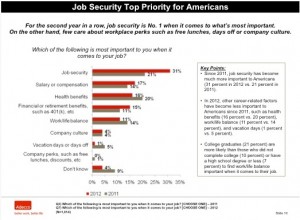 Many of you remember in the 1999 when U.S. unemployment was 4.1%. It was heaven for employees. Companies were competing for employees. Companies were raising salaries and offering a wide range of traditional and non-traditional perks to attract and retain employees. In a market like that job security is not generally top of mind.
Many of you remember in the 1999 when U.S. unemployment was 4.1%. It was heaven for employees. Companies were competing for employees. Companies were raising salaries and offering a wide range of traditional and non-traditional perks to attract and retain employees. In a market like that job security is not generally top of mind.
Now, according to the Adecco Workplace Insights Survey of 2012, Americans consider job security the number one concern when it comes to their job. The survey found 31% ranked it as the most important issue, up from 21% in 2011. Of respondents, 17% ranked salary at the top, and 16% ranked healthcare at the top. This is interesting in a time when the national discussion over healthcare is rather heated.
What about the perks that were so famously waved in front of employees in 1999? Looking at the survey, the respondents say perks-smerks! Zero percent ranked things like free lunches as most important to them.
What would it take for employees to leave their job? Even though security is of chief importance, 72% would change jobs for increased compensation. Following this theme of job security, 64% would change jobs for — you guessed it — guaranteed job security.
What does this information mean to employers and recruiters?
If you want to attract talent, you must be able to address their needs and motivations. If those surveyed is an indication of most Americans, then we must listen to the resounding cry for job security.
In an uncertain market (or any market), it is not possible to guarantee job security. Truly, the company’s customers have the biggest say when it comes to job security. However, employers and recruiters can establish systems and processes to carefully screen, assess, and place candidates in a job in which they will be successful. Successful employees contribute to a company’s profit. On the flipside, candidates must be diligent in researching and assessing their potential employer before accepting a job.